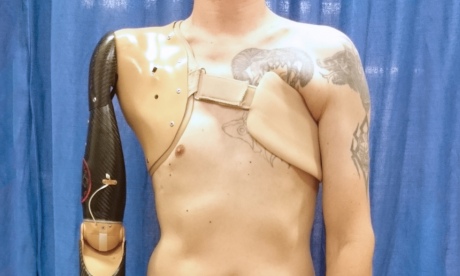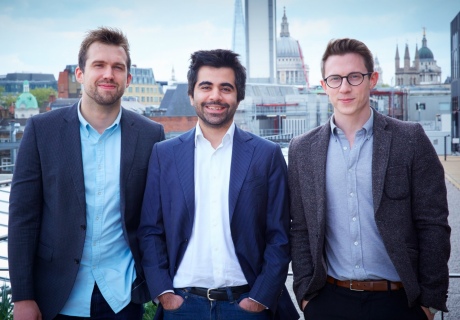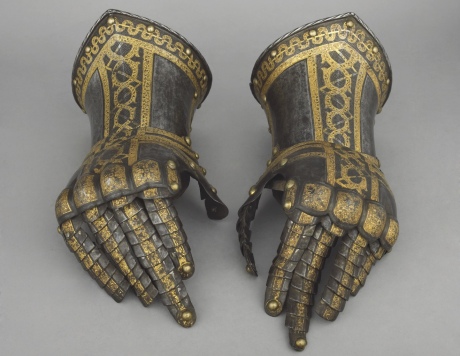The 10 most popular Imperial news stories of 2017

The past 12 months have provided many eye-grabbing headlines from the Imperial community from world-leading research to incredible inventions.
Before 2018 is upon us with its own wave of news, we take a quick look back at the most popular articles on our award-winning news site (ranked by the number of page views).
Here are our top 10 stories of 2017.
10. Prosthetic arm technology that detects spinal nerve signals developed by team

In February, scientists from the Department of Bioengineering demonstrated sensor technology for a robotic prosthetic arm that detects signals from nerves in the spinal cord.
The team explained that detecting signals from spinal motor neurons in parts of the body undamaged by amputation, instead of remnant muscle fibre, means that more signals can be detected by the sensors connected to the prosthetic. This means that ultimately more commands could be programmed into the robotic prosthetic, making it more functional.
Read what the New Scientist had to say about the study
9. New urine test can quickly detect whether a person has a healthy diet

This new five-minute test, developed by Imperial researchers in collaboration with Newscastle and Aberystwyth universities, can detect markers of such foods as red meat, chicken, fruit and vegetables, as well as how much fat, sugar, fibre and protein a person has eaten.
While in its early stages, the researchers said the test could be a more accurate record of people’s diets than food diaries.
Read what the BBC had to say about the test
8. Imperial graduates' startup valued at $1 billion

In May, it was announced that virtual reality firm Improbable – a startup co-founded by Imperial computing graduate Peter Lipka (pictured left) – had raised an astounding $502 million. The investment from SoftBank values the London-based technology startup at more than $1 billion.
Speaking of his former student, Professor Andrew Davison, Head of the Dyson Robotics Lab at Imperial said: “Peter was one of the brightest students I’ve supervised. In his individual final year project he developed an AI software program that could automatically understand a video game and learn how to play it from only seeing pixels on the screen. He was always remarkably self-driven and I am not surprised to see him go on to such great success.”
7. Dad's involvement with baby early on associated with boost in mental development

In the same month, an Imperial co-authored study offered fresh insights into fatherhood and its impact on the early stages of children’s development.
The study, published in the Infant Mental Health Journal, revealed that fathers who interact more with their children in their first few months of life could have a positive impact on their baby's cognitive development.
The study was picked up far and wide in the press, from GQ, to The Australian, and the BBC.
6. First evidence for higher state of consciousness found

The effects of psychedelic drugs on the human brain always captures the eye of Imperial news readers, and this story was no different.
In mid-April, neuroscientists from the College’s Department of Medicine and partner universities revealed they had observed a sustained increase in the diversity of brain signals of people under the influence of psychedelic drugs, compared with when they were in a normal ‘awake and aware’ state.
Explaining the potential of this finding, Imperial’s Dr Robin Carhart-Harris said: "People often say they experience insight under these drugs – and when this occurs in a therapeutic context, it can predict positive outcomes. The present findings may help us understand how this can happen.”
Here's what Wired, the NY Daily News and the Independent wrote about the study.
5. Drinking coffee reduces risk of death from all causes, study finds

Coffee drinkers around the world rejoiced when this research landed in July. The landmark study, carried out by Imperial and the International Agency for Research on Cancer (IARC) found that people who drink around three cups of coffee a day may live longer than non-coffee drinkers.
In short, it was found that higher levels of coffee consumption were associated with a reduced risk of death from all causes, particularly from circulatory diseases and diseases related to the digestive tract.
Understandably, the story was picked up widely in the press. Read what the Times, Daily Mail, the Scotsman and Men’s Health had to say about the study.
4. 'Fat but fit' are at increased risk of heart disease

Carrying extra weight could raise your risk of heart attack by more than a quarter, even if you are otherwise healthy. This was the main finding of the fourth most read story on the Imperial news site of the year.
As highlighted at the time by the research team from the College’s School of Public Health, The study adds to a growing body of evidence that suggests being ‘fat but fit’ is a myth, and that people should aim to maintain a body weight within a healthy range.
Here’s what the Washington Times, the BBC, and the New Scientist had to say.
3. Eating more fruits and vegetables may prevent millions of premature deaths

Also on a healthy living theme, this study announced in February revealed that a fruit and vegetable intake above five-a-day shows major benefit in reducing the chance of heart attack, stroke, cancer and early death.
Where five fruit and veg a day is good, 10 is better – this is the general line which the press ran with, as these articles from the Guardian, BBC and Daily Telegraph demonstrate.
The study made the Altmetric top 100 list of the most discussed journal articles of 2017
2. Physicists shed light on rarely seen 16th Century metal-working technique

A 16th century gauntlet caught people’s eye in August when a team of Imperial physicists analysed it using a method usually used to study solar panels. The team were able to discern exactly which medieval anti-rusting method – or ‘bluing’ – had been used. They were able to do this via spectroscopic ellipsometry, a method normally used by the researchers to study the effect of different films applied to the surface of solar panels.
The story really found its audience on the social news platform, Reddit, where members of the History subreddit community shared their fascination in the time traversing applications of science.
1. Magic mushrooms may 'reset' the brains of depressed patients

‘Magic mushrooms may 'reset' the brains of depressed patients’ – this was the headline that drew most eyes on the Imperial news site in 2017.
Researchers from the Faculty of Medicine used psilocybin – the psychoactive compound that occurs naturally in magic mushrooms – to treat a small number of patients with depression in whom conventional treatment had failed. The researchers described patient-reported benefits lasting up to five weeks after treatment, and believe the psychedelic compound may effectively reset the activity of key brain circuits known to play a role in depression.
When the study was published in October, it gained a lot of interest in the media, including Newsweek, New Scientist and the Guardian.
The study made the Altmetric top 100 list of the most discussed journal articles of 2017.
–
Enjoy reading Imperial’s research and College news? Be the first to catch our stories with Imperial Today – the daily email bulletin of the College’s freshest online news and digital content. Sign up to Imperial Today.
Article text (excluding photos or graphics) © Imperial College London.
Photos and graphics subject to third party copyright used with permission or © Imperial College London.
Reporter
Andrew Youngson
Communications Division